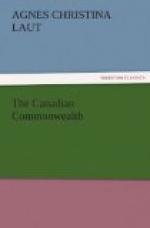The point is—when the rebellion had passed, Canada had overthrown a system of government by oligarchy. She had ousted special interests forever from her legislative halls. In a blood and sweat of agony, on the scaffold, in the chain gang, penniless, naked, hungry and in exile, her patriots had fought the dragon of privilege, cast out the accursed thing and founded national life on the eternal rocks of justice to all, special privileges to none. Her patriots had themselves learned on the scaffold that law must be as sacredly observed by the good as by the evil, by the great as by the small. From the death scaffolds of these patriots sprang that part of Canada’s national consciousness that reveres law next to God. Canada passed through the throes of purging her national consciousness from 1815 to 1840, as the United States passed through the same throes in the sixties, but the process cost her half a century of delay in growth and development.
While the union of Upper and Lower Canada put an end to the evils of special privileges in government, events had been moving apace in the far West, where roving traders and settlers were a law unto themselves. Red River settlers of the region now known as Manitoba were clamoring for an end to the monopoly of the Hudson’s Bay Fur Company over all that region inland from the Great Northern Sea. The discovery of gold had brought hordes of adventurers pouring into Cariboo, or what is now known as British Columbia. Both Red River and British Columbia demanded self-government. Partly because England had delayed granting Oregon self-government, the settlers of the Columbia had set up their own provisional government and turned that region over to the United States. We are surely




